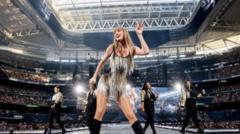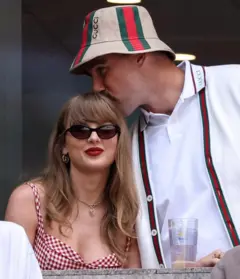In a battle resonating through the heart of Madrid, local residents are grappling with noise levels generated by concert events at Real Madrid's iconic Bernabéu Stadium. The stadium, recently renovated to host a variety of events, saw thousands flock to its gates last May for two sold-out shows by pop sensation Taylor Swift. However, the lucrative concerts also drew complaints, leading to a legal standoff that has left the future of live music at the venue hanging in the balance.
Just days following Swift's electrifying performances, residents lodged a complaint about noise disturbances, which forced Real Madrid to halt all upcoming concerts in September. Spanish pop star Aitana is among the latest artists to move her planned shows to Atletico Madrid's Metropolitano Stadium as tensions escalate among the community.
Enrique Martínez de Azagra, president of a local residents' association, expressed deep concerns about the impact of the concerts on health. With disturbances regularly exceeding 90 decibels, he highlighted potential risks such as migraines, insomnia, and heart complications. "It is impossible to suffer this kind of noise," he lamented, emphasizing that Spanish laws classify such disturbances as crimes.
Reports indicate that European standards label any exposure above 55 decibels as detrimental to health, igniting fears of heightened risks for cardiovascular issues. Enrique insisted that the noise generated by concerts greatly contrasts with that produced during football matches, which typically last two hours and fluctuate in volume.
The residents' pushback culminated in a lawsuit against the football club, indicating a fierce commitment to their cause. Felippo Maria Ricci, a sports journalist, opined that the residents might have a potent case, given their long-standing ties to the area and the influential status they hold within the community.
While the allure of concert tourism remains significant—12 million euros generated during the Taylor Swift shows alone—the city government seems reluctant to act decisively against a source of substantial revenue. Following a monumental £1.1 billion renovation, the stadium was designed for multifunctional use, paired with contracts for commercial rights, heightening the stakes of the noise controversy.
Protest banners now hang from residents' balconies and windows, echoing sentiments that a balance must be struck. Some locals recall more occasional concerts with fondness but argue that hosting up to 20 shows a year is excessive.
As the neighborhood adapts to an ongoing court case, many residents remain skeptical of the club's attempts at soundproofing, citing inherent structural limitations. With local health centers reporting inaccuracies in medical measurements due to concert-related noise, discontent continues to echo through the community.
For now, the stage at the Bernabéu lies silent, leaving both the fate of live music there and the residents' peace unresolved.





















